Unit11课件教学文档
- 格式:ppt
- 大小:1.30 MB
- 文档页数:22
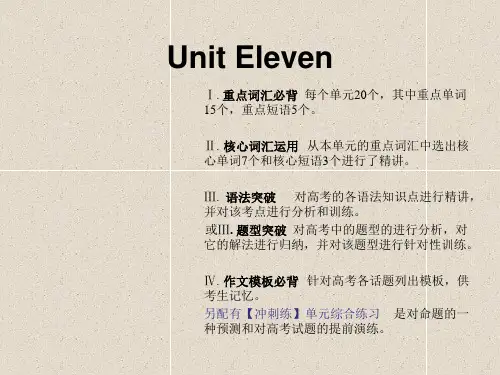
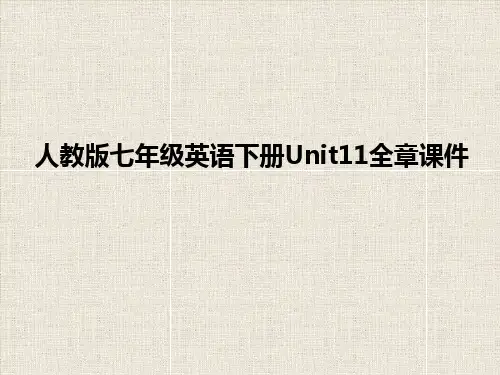
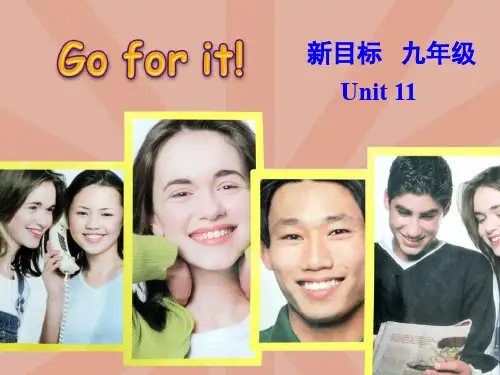
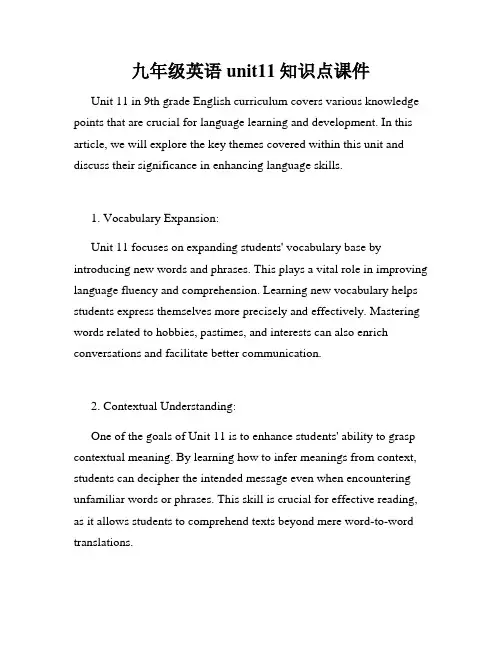
九年级英语unit11知识点课件Unit 11 in 9th grade English curriculum covers various knowledge points that are crucial for language learning and development. In this article, we will explore the key themes covered within this unit and discuss their significance in enhancing language skills.1. Vocabulary Expansion:Unit 11 focuses on expanding students' vocabulary base by introducing new words and phrases. This plays a vital role in improving language fluency and comprehension. Learning new vocabulary helps students express themselves more precisely and effectively. Mastering words related to hobbies, pastimes, and interests can also enrich conversations and facilitate better communication.2. Contextual Understanding:One of the goals of Unit 11 is to enhance students' ability to grasp contextual meaning. By learning how to infer meanings from context, students can decipher the intended message even when encountering unfamiliar words or phrases. This skill is crucial for effective reading, as it allows students to comprehend texts beyond mere word-to-word translations.3. Grammar Structures:Unit 11 introduces several essential grammar structures. Students study the present perfect tense, which is commonly used to express experiences and actions that have occurred in the past but have a connection to the present. Understanding and utilizing this tense empowers students to articulate their thoughts more accurately and convey a timeline of events correctly.4. Sentence Variation:Unit 11 also emphasizes the importance of sentence variation. Students are encouraged to diversify their sentence structures by using different sentence types, such as simple, compound, and complex sentences. This skill ensures more engaging and coherent writing, promoting effective communication and demonstrating linguistic creativity.5. Speaking and Listening Skills:Unit 11 provides various opportunities for students to develop their speaking and listening skills. Engaging in conversations about hobbies, interests, and aspirations allows students to practice active listening and oral expression. Collaborative activities, such as role-plays and group discussions, foster a supportive learning environment that encourages students to articulate their thoughts confidently.6. Cultural Insights:Aside from language development, Unit 11 also introduces students to different cultures and encourages cultural appreciation. By exploring hobbies and interests from various countries, students gain insight into global diversity and foster respect for different lifestyles. This promotes intercultural understanding, which is crucial in an increasingly interconnected world.7. Critical Thinking:Unit 11 incorporates critical thinking exercises to stimulate students' analytical and problem-solving skills. By engaging in activities that require them to evaluate and extract relevant information from texts, students enhance their cognitive abilities. This fosters independent thinking and encourages students to approach challenging tasks with confidence.8. Reflective Writing:Unit 11 incorporates reflective writing tasks that encourage students to introspect and express their thoughts and feelings. Reflective writing enables self-awareness and enhances emotional intelligence, allowing students to explore their interests, strengths, and areas for improvement. This promotes personal growth and self-expression.In conclusion, Unit 11 of the 9th grade English curriculum encompasses various knowledge points that are essential for language development. By focusing on vocabulary expansion, contextual understanding, grammar structures, sentence variation, speaking and listening skills, cultural insights, critical thinking, and reflective writing, students can enhance their language fluency and overall communication abilities. These skills not only empower students in English but also equip them with valuable tools for success in their personal and professional lives.。
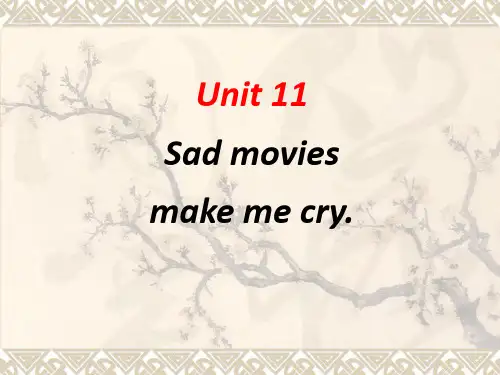
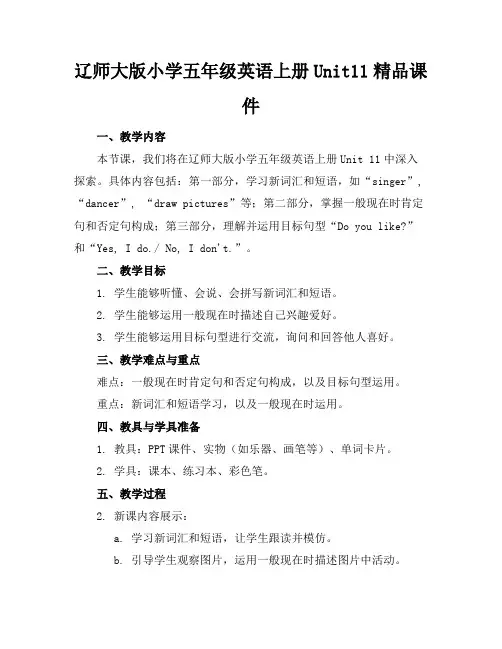
辽师大版小学五年级英语上册Unit11精品课件一、教学内容本节课,我们将在辽师大版小学五年级英语上册Unit 11中深入探索。
具体内容包括:第一部分,学习新词汇和短语,如“singer”, “dancer”, “draw pictures”等;第二部分,掌握一般现在时肯定句和否定句构成;第三部分,理解并运用目标句型“Do you like?”和“Yes, I do./ No, I don't.”。
二、教学目标1. 学生能够听懂、会说、会拼写新词汇和短语。
2. 学生能够运用一般现在时描述自己兴趣爱好。
3. 学生能够运用目标句型进行交流,询问和回答他人喜好。
三、教学难点与重点难点:一般现在时肯定句和否定句构成,以及目标句型运用。
重点:新词汇和短语学习,以及一般现在时运用。
四、教具与学具准备1. 教具:PPT课件、实物(如乐器、画笔等)、单词卡片。
2. 学具:课本、练习本、彩色笔。
五、教学过程2. 新课内容展示:a. 学习新词汇和短语,让学生跟读并模仿。
b. 引导学生观察图片,运用一般现在时描述图片中活动。
c. 学习目标句型,并进行角色扮演,进行实际交流。
3. 例题讲解:通过PPT展示例题,引导学生分析并解答。
4. 随堂练习:学生完成练习册上题目,巩固所学知识。
六、板书设计1. 新词汇和短语:singer, dancer, draw pictures, play chess, like, do, don't等。
2. 句型:Do you like? Yes, I do./ No, I don't.3. 例题:一般现在时肯定句和否定句。
七、作业设计1. 作业题目:a. 写出本节课所学5个新词汇和短语,并造句。
A: Do you like playing chess?B: ____________. I like ____________.2. 答案:a. 略。
b. Yes, I do./ No, I don't. playing chess/ singing/ dancing/ drawing pictures等。
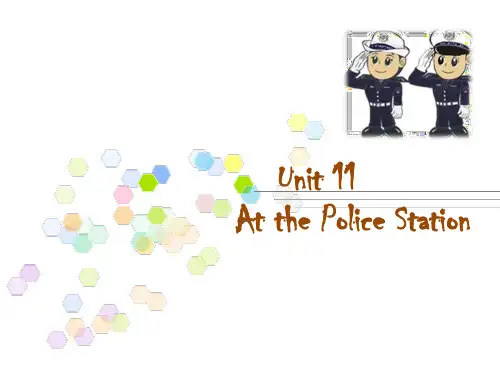
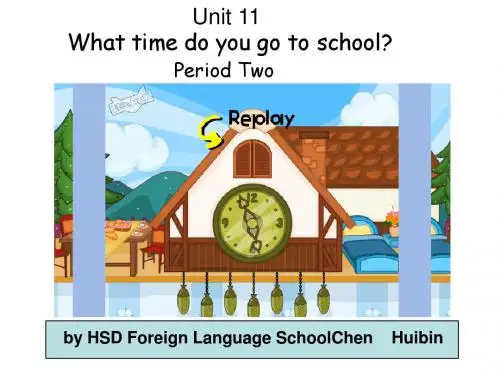
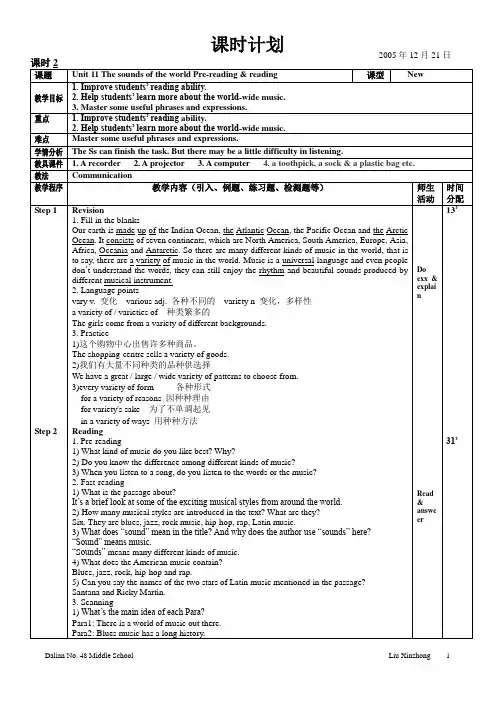
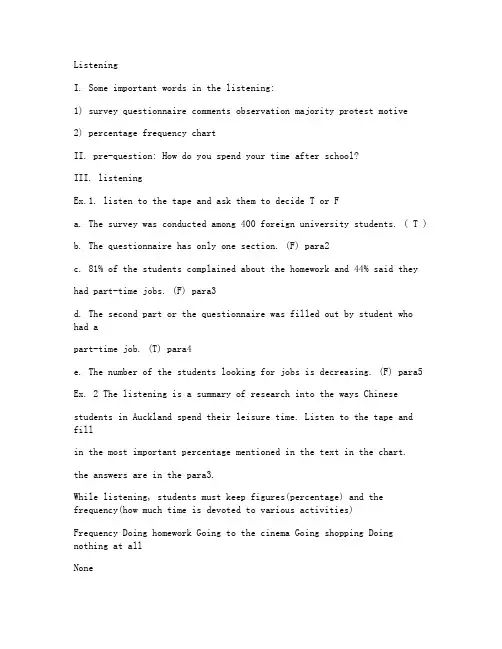
ListeningI. Some important words in the listening:1) survey questionnaire comments observation majority protest motive2) percentage frequency chartII. pre-question: How do you spend your time after school?III. listeningEx.1. listen to the tape and ask them to decide T or Fa. The survey was conducted among 400 foreign university students. ( T )b. The questionnaire has only one section. (F) para2c. 81% of the students complained about the homework and 44% said theyhad part-time jobs. (F) para3d. The second part or the questionnaire was filled out by student who had apart-time job. (T) para4e. The number of the students looking for jobs is decreasing. (F) para5Ex. 2 The listening is a summary of research into the ways Chinesestudents in Auckland spend their leisure time. Listen to the tape andfillin the most important percentage mentioned in the text in the chart.the answers are in the para3.While listening, students must keep figures(percentage) and the frequency(how much time is devoted to various activities)Frequency Doing homework Going to the cinema Going shopping Doing nothing at allNoneHardlyLittleSometimes 69% 75% 56%MuchMost 62%All 25% (1/4)Ex.3 Listen to the para4 and draw a pie chart of the things working studentsspend their money on. (On the textbook, P 92 ,Ex.3)the answer is in the para 4Ex. 4 Fill in the blanks with the missing words.The second part of the questionnaire was only filled out by students who had a part-time job. Most of them (94%) said that it had been easy tofind a job, with 60% saying this was their first job. 81% said thattheir parents had protested, but given in on the condition that their school results would not suffer. All students said that the greatest advantage of having a part-time job lay in having more money, though 23% of the students said working with and getting to know other people was something they enjoyed. Asked what they use the money for, students mentioned various free-time occupations, as described in part one of the survey. Of all other things they spend their wages on, the mostimportant were phone calls(40%), followed closely by clothes and makeup (35%) and going out (15%). Only 10% of the students said they put away money in a savings account.The results of the survey seem to suggest that Chinese students abroad have little time for part-time jobs. They spend most of their free time doing homework. However, an increasing number of students look for jobs. They seem to enjoy it, and are able to combine it with their school work. While the majority of the students said the main motive to look for ajob was money, about one fifth of the students enjoyed contacts and getting to know people in a different setting, away from school.Reading : Making the team workI. Match the main idea with each partPart1 (para1-2) a. What is a team.Part2 (para3-4) b. sports teamPart3 (para5) c. Working in groups at school is an opportunity to learn about teamwork.Part4 ( para6) d. How can group work be successfulPart5 (para7) e. Different members in the teams can occupy different jobs.Part6 (para8-10) f. How to make teams function well.II. Fast-reading questions:1. What is a team?A team is a group of individual people brought together in order to accomplish a task that cannot be efficiently of effectively completed by an member of the group alone. ( Para. 2)2. What is the function of group work?Group work makes us aware of the role that is most suitable for each of us, bring the benefit of getting experience working with other people, show us h ow other people’s roles fit the purpose of the group and teaches us to be patient and how to respect to different personalities. (para5)3 According to the author, what are requirements for teams to function well?All team members should respect each other, have clear roles, support and help each other. (para6)4. How are the tasks of the group divided?The tasks of the group are divided depending on the personalities and abilities of the individuals in the group. (para8)5. How can we make the best of working with our classmates?We should recognise their strengths and weaknesses. Their differences are the strength of the team. Knowing other people’s shortcomings can help us avoid embarrassing them. (para9)III. careful- readingA. True or False1. In a sports team, the coach must be a member of the team. (F) para32. In sports teams, group work can be successful when members respect, help and support each other. (T) para63. Sports teams require leaders, people to create ideas, people to develop ideas, people to do practical work, people to comment on and improve ideas, people to identify and solve problems, and people to suggest solutions. (T) para74. Only rules and regulations can help teams function well. (F) para85. Only people with the same personality work well together. (F) para96. The author thinks the statement that some team members work best in tasks alone is contradictory. (F)B. Choose the best answers:1. In sports games , a player _______ . BA. often changes his roleB. has a clear roleC. feels that players with different abilities make different contributions to the teamD. accepts the same expectations and responsibilities as the other players2. The author takes _____ for example to show how a team can work well AA. the sports teamB. the project teamC. the rugby teamD. a dynamic team3.In order for a team to function well , people of the team must ______ . DA. respect each otherB. co-operateC. obey necessary rules and regulationsD. all the above4.Group work at school is important to students because _______ . DA. it is an opportunity to learn more about team workB. it brings the benefit of getting experience working with othersC. it teaches us to be patient and how to respond to different personalitiesD. it is a preparation for our working days to come5.Why it is important in a team to know someone’s personality type and ability ? DA. We can know a great deal about that personB. Lack of recognition of differences in human function can be avoidedC. We can build strong and good relationships between members of a teamD. Both B and C6.What is the main idea of Paragraph 7 ? CA. How a project team is different from a rugby teamB. How a project team worksC. In a project team , people who have different abilities and personalities have different roles in the teamD. How the tasks of the group are divided depends on personalities and abilities of the individuals in the group7. In the whole text , the author mainly talks about _______ . AA. the elements that make the team workB. the importance of social relationships within a teamC. the roles that different people of a group playD. the comparison between a project team and a rugby team8.According to the text , which of the following statements is notright ? AA. The coach of a sports team is not counted as a team member , so he is less importantB. Social relations are important within the teamC. The atmosphere in the group affects the performance of the teamD. It’s not necessary for all team members to be friends9. We can infer from the test that ______ . BA. the players in a rugby team should co-operate while the people in a project team needn’tB. the players in a rugby team have clear roles while people in aproject team may not haveC. the coach of a rugby team discusses strategy and makes decisions while the leader of a project team doesn’tD. the coach of a rugby team is important while the leader in a project team may not be as importantC. further understanding1) Try to compare the rugby team with the project teamSimilarities 1. They are both teamwork.2. All team members should respect, help and support each other.3. The tasks of the teams should be divided according to the personalities and abilities of the team members.DifferencesProject team Rugby team1. Team members may combine roles. 1. the work division is clear and each player has a clear role.2. The number of players is changeable. 2. The number of players is not changeable.3. The purpose is to build buildings. 3. The purpose is to win a match.IV. Phrases:1. for the sake of.. =for one’s sake 为了…,由于,看在…的份上2. in reality 实际上prar2:3. bring together 组合,集合para3:4. common goal 共同目标5. be counted as… 被算作…6. social relation 社会关系7. make an equal contribution 做出同等贡献para4:8. there are no conflicts abou t… 对…没有异议9. be attached to 附属于;将某物系在另一物上;将某物与另一物相联系10. be aware of… 意识到;para5:11. be most suitable for… 对…最适合12. bring the benefit 带来好处13. fit the purpose of… 适合..的目的14. respond to different personalities 应对不同个性的人para6:15. as with=as to =as for 就…而言,至于…16. the work division 分工17. perform at the right level 发挥正常水平18. a project team 项目小组19. combine roles 身兼数职20. bring new energy to… 给…带来新鲜活力21. keep an eye on… 监管,照看;22. compromise in conflicts 在矛盾中协调23. keep peace and harmony 保持平静和谐para8:24. guard against… 防止25. take into account= take into consideration= take account of 对…加以考虑, 顾及para9:26. to make the best of doing… 为了做…到最好;27. strengths and weakness 强弱项,优缺点;para10:28. the lack of recognition of.. 对…认识的缺乏;29. human functioning 人体机能Integrating skills reading: Ticket to SuccessI. Warming -up question:What do you want to do after you graduate from high school?Most of us are studying here aimed at going to universities. Is it the only way to succeed?II. Fast readingLi yonghong made two important decisions in her life. What are they? (Para.1、2)1). Left school and took a one-year training course to become a hairdresser.2). Learnt how to do make-up.III. careful reading1. Read the text quickly and explain what the text is about?The text is about choices in life and careers. It suggests that different people have different talent, and that in order to be successful ,society and people have to make the best of their talent.2. The author distinguished two personality types .What are they?Mental intellectual type and hands-on experiences type3. In order to become successful, what must we do? ( Para. 4、5、6)1). explore your talents and get to know yourself so as to find out where your real interests lie.2). follow what feels right.3). we must make the most of our special talents and interests.4. What are the different learning styles:( Para. 7)1). schools and universities2). to try, experiment and find their way through hands-on experience IV. Phrases:1. have sb./sth.in mind 在想…,计划…bear/keep sb./sth. In mind记住,记…在心里have…on one’s mind 把…挂在心上2. congratulate sb. on/upon (doing) sthcongratulate sb. on one’s marriage/ new job/ good exam results congratulate oneself on/upon (doing) sth认为自己幸运或成功3. manage the finances 管理财务4. put…to go od use5. do make-up 化妆6. tend to 倾向于7. live up to 依照某事物行事,表现出符号某事物的标准eg: fail to live up to his parents’ expectations8. get to know oneself 了解自己9. follow what feels right 跟着感觉走follow your own interest10. make the most of….11..hands-on: practical亲身实践的,实习的12. accommodate sth to sth 适应,迁就,迎合13. in unique way 以独特的方式14. inner processes 内部作用。